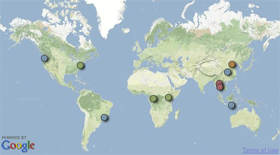
WRI’s goal is to harness markets and enterprise to expand economic opportunity and protect the environment. Read more
Private enterprise has an enormous influence on human and economic development around the world. Businesses provide goods and services that meet essential human needs, create jobs and wealth in communities, and produce technologies that enhance the quality of life and productivity of the economy. These important functions, however, often come at the expense of the environment and social conditions. Many negative global environmental trends can be traced to industry’s extraction of natural resources, emission of pollutants, and overall large environmental footprint. Industrial activities can also directly impact human health and access to resources that communities depend upon.
Although the private sector has been a source of many problems, it also has a critical role to play as a provider of solutions in moving society to live in ways that meet the needs of current and future generations. As the influence of the private sector grows around the world, NGOs have a unique opportunity for collaboration with the private sector to steer business investment and innovation toward finding solutions to environment and development challenges.
WRI’s Markets and Enterprise Group produces economically sound policies, bold vision, and practical solutions in collaboration with the business community. To channel the private sector to incorporate environmental and social opportunities into core business strategies, we employ the following approaches:

Build Market Demand:
Expand the market for goods and services that protect the climate and ecosystems – such as green power, certified forest products, and responsibly mined metals – by enabling the environment for these products to grow and by developing cost-competitive procurement strategies.

Create Sustainable Enterprises:
Demonstrate not only a new way of doing business, but also the power of the private sector to reduce poverty and protect the environment. Enable entrepreneurs and corporations to develop profitable business approaches to climate change, ecosystem degradation, and improving people’s lives.

Establish Economic Incentives: Secure policies that use price incentives, such as market-based controls on greenhouse gases, to drive efficiency, business investment in environmentally superior technologies, and growth of new markets. Eliminate perverse subsidies that support markets for climate- and ecosystem-damaging products.

Promote Green Investing:
Change how financial markets value companies by making the incorporation of environmental value and risk into investment decisions standard practice as a means to influence corporate performance and strategy.

Train New Leaders:
Ensure that current and future executives view sustainability as a business driver and have the managerial skills to deliver financial, environmental, and societal value.

Tools and Analysis:
WRI has developed tools and databases to give corporations, NGOs, and entrepreneurs from across the globe access to the models and idea’s they need for success.
Stories
Projects
Staff
 Director, Markets & Enterprise Program |  Associate I |












